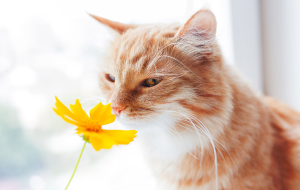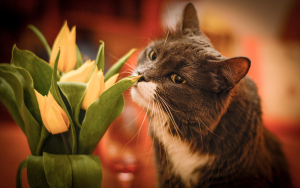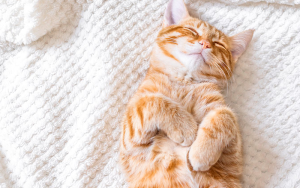What to Do When Your Kitten Has Conjunctivitis

Introduction
Conjunctivitis in kittens can be a concerning condition, but with proper care and attention, it can usually be managed effectively. Conjunctivitis, often referred to as “pink eye,” is an inflammation of the conjunctiva, the thin, clear tissue that covers
the white part of the eye and the inner surface of the eyelids. Understanding the causes and symptoms of feline conjunctivitis is the first step in providing the best care for your kitten.
Recognize the Symptoms
Red and Inflamed Eyes
The most obvious sign of conjunctivitis is redness in the eyes. The normally clear whites of the eyes may become blood – red or have a pinkish hue. The conjunctiva itself will also appear swollen and puffy. This inflammation can make the eyes look larger
than normal or give the impression that the eyelids are bulging. Kittens may blink more frequently or keep their eyes partially closed due to the discomfort caused by the redness and swelling.
Discharge from the Eyes
Another common symptom is the presence of a discharge. The discharge can vary in consistency and color. It may be a clear, watery fluid, similar to tears, which is often an early sign of irritation. As the condition progresses, the discharge can become
thicker and more opaque, ranging from a whitish to a yellowish – green color. The discharge can cause the fur around the eyes to mat and stick together, and it may crust over the eyelids, making it difficult for the kitten to open its eyes fully.
Squinting and Pawing at the Eyes
Kittens with conjunctivitis may squint or blink spasmodically as a way to relieve the irritation. They might also use their paws to rub or scratch at their eyes, which can further aggravate the condition and potentially lead to more serious eye injuries.
Constant pawing at the eyes is a clear indication that something is wrong and should prompt you to take a closer look at your kitten’s eyes.
Determine the Cause
Viral Infections
The most common cause of conjunctivitis in kittens is viral infections. Feline herpesvirus – 1 (FHV – 1) and feline calicivirus are two prevalent viruses that can lead to eye problems. These viruses are highly contagious among cats and kittens and can
be spread through direct contact, such as nose – to – nose greetings, sharing of food bowls, or through the air when an infected cat sneezes or coughs. Kittens are particularly vulnerable to these viruses because their immune systems are still developing.
Bacterial Infections
Bacterial infections can also cause conjunctivitis. Staphylococcus and Streptococcus are among the bacteria that can infect the eyes of kittens. Bacterial conjunctivitis can occur on its own, but it’s often secondary to a viral infection. When the virus
weakens the kitten’s immune defenses, bacteria can take advantage and multiply in the eye, leading to a more severe and persistent form of conjunctivitis.
Allergies and Irritants
Allergies to environmental factors such as pollen, dust mites, or certain chemicals can trigger conjunctivitis. Kittens may also experience eye irritation from foreign objects like a stray eyelash, a speck of dirt, or a piece of grass that has gotten
into their eyes. In these cases, the conjunctivitis is usually a reaction to the physical or chemical irritant and may resolve once the cause is removed.
Home Care and Treatment
Clean the Eyes
Gentle eye cleaning is a crucial first step in treating kitten conjunctivitis. You’ll need a clean, soft, damp cotton ball or a sterile eye – cleaning solution recommended by a veterinarian. Gently wipe away any discharge from the corners of the eyes
and along the eyelids. Start from the inner corner of the eye and move outward to avoid pushing debris further into the eye. Be very careful not to touch the eyeball directly to prevent further injury or irritation. Clean the eyes as often as needed
to keep them free of discharge, usually several times a day.
Apply Warm Compresses
Applying a warm compress to the affected eyes can help reduce inflammation and soothe the discomfort. Soak a clean, soft cloth in warm water (not hot), wring out the excess water, and gently place it over the kitten’s closed eyes for a few minutes. Do
this several times a day. The warmth can improve blood circulation around the eyes and may help loosen any crusty discharge, making it easier to clean.
Isolate the Kitten (if necessary)
If the conjunctivitis is caused by a contagious virus or bacteria, it’s important to isolate the kitten from other cats to prevent the spread of the infection. Keep the infected kitten in a separate room with its own food, water, and litter box. Wash
your hands thoroughly after handling the sick kitten and before touching other pets. This helps minimize the risk of transmission and protects the health of your other furry companions.
When to Seek Veterinary Attention
Persistent or Worsening Symptoms
If the symptoms of conjunctivitis do not improve after a few days of home treatment or if they seem to be getting worse, it’s time to seek veterinary help. This includes an increase in redness, swelling, or discharge, or if the kitten seems to be in more
pain, such as increased pawing or crying. A veterinarian can perform a more in – depth examination to determine the exact cause of the conjunctivitis and prescribe appropriate medications.
Suspected Foreign Object in the Eye
If you suspect that there might be a foreign object in the kitten’s eye, it’s best to take it to the vet immediately. The veterinarian has the tools and expertise to safely remove the object and prevent further damage to the eye. Signs of a possible foreign
object include excessive blinking, tearing, or a visible object in the eye.
Underlying Health Conditions
Kittens with pre – existing health problems, such as a weakened immune system due to other diseases or a congenital eye defect, are at higher risk of developing severe conjunctivitis. If your kitten has any such conditions and shows signs of eye inflammation,
it’s essential to consult a veterinarian promptly to ensure proper treatment and prevent complications.
Veterinary Treatment Options
Antibiotics
If the conjunctivitis is caused by a bacterial infection, the veterinarian may prescribe antibiotic eye drops or ointment. These medications are designed to kill the bacteria and reduce the inflammation. It’s important to follow the vet’s instructions
carefully when administering these medications. Usually, you’ll need to apply the drops or ointment a few times a day for a specified period, which can range from a few days to a couple of weeks depending on the severity of the infection.
Antiviral Medications
For viral – induced conjunctivitis, antiviral medications may be necessary. These drugs can help control the replication of the virus and speed up the healing process. However, antiviral treatments for feline herpesvirus – 1, for example, are not always
curative, as the virus can remain dormant in the kitten’s body and reactivate later. The vet will also consider the kitten’s overall health and the specific virus involved when deciding on the most appropriate antiviral treatment.
Anti – Inflammatory Drugs
In addition to antibiotics and antivirals, anti – inflammatory drugs may be prescribed to reduce the redness and swelling in the eyes. These can be in the form of eye drops or oral medications, depending on the severity of the inflammation and the kitten’s
individual needs. Anti – inflammatory treatment helps relieve the kitten’s discomfort and promotes faster healing.
Conclusion
Conjunctivitis in kittens is a common but manageable condition. By being vigilant about your kitten’s eye health, recognizing the symptoms, and taking appropriate steps for treatment and care, you can help your furry friend recover quickly and maintain
good eye health. Remember, if you’re ever in doubt about your kitten’s condition, it’s always best to consult a veterinarian for professional advice and guidance.







